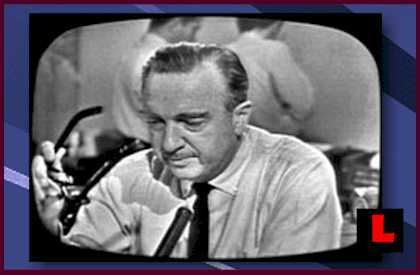
I always knew I’d feel sad when Walter Cronkite died. As I saw him age, I knew it would happen and yet now that is has happened, Friday was definitely a sad day for journalism and America.
Anyone who knows anything about journalism knows that two names loom larger than anybody in the development of this business: Edward R. Murrow and Cronkite. Murrow was the father of modern-day reporting, a no-nonsense style that catered toward giving the facts and telling the truth. Cronkite was part of the next generation – Murrow’s handpicked successor who birthed the modern-day TV newsanchor while never losing the essence of being a reporter.
I admired him because he didn’t want to be bigger than the story. He was from a school of reporting that every journalism junkie should be – get the facts and tell it straight, no chaser. Travel to wherever the story is. And most of all, while being detached, don’t be afraid to empathize with the viewer when appropriate.
His voice was reassuring and he reminded folks of a grandfatherly figure who sought to earn your trust. The label “Most Trusted Man in America” was something he earned night in, night out and in an era of 3 TV networks, he succeeded.
Anyone who knows anything about journalism knows that two names loom larger than anybody in the development of this business: Edward R. Murrow and Cronkite. Murrow was the father of modern-day reporting, a no-nonsense style that catered toward giving the facts and telling the truth. Cronkite was part of the next generation – Murrow’s handpicked successor who birthed the modern-day TV newsanchor while never losing the essence of being a reporter.
I admired him because he didn’t want to be bigger than the story. He was from a school of reporting that every journalism junkie should be – get the facts and tell it straight, no chaser. Travel to wherever the story is. And most of all, while being detached, don’t be afraid to empathize with the viewer when appropriate.
His voice was reassuring and he reminded folks of a grandfatherly figure who sought to earn your trust. The label “Most Trusted Man in America” was something he earned night in, night out and in an era of 3 TV networks, he succeeded.

One defining moment was November 22, 1963 . The way he announced President Kennedy’s death was emotional, yet restrained. Just watch that still shot before you watch this video around the 3:18 mark. Glasses slowly removed, pain on his face, words halting. A moving site that defined a nation's pain.
And yet it was reassuring, the calming presence a nation needed in explosive grief yet I wondered what Cronkite thought that day. His reaction would influence anchors on future days of sadness. Think Jim McKay after the Munich Olympics massacre, Peter Jennings after 9/11, Anderson Cooper after Hurricane Katrina – all of them learned how to report difficult circumstances after Cronkite.
Another defining moment came five years later when he called the Vietnam war a “stalemate.” I remember hearing that in a history class at USD and it pretty much said what most thought during that tumultuous year. I love it because it combined journalism with anchor commentary - Cronkite went to Vietnam a few times during the Tet offensive and saw events firsthand through his reporting, leading him to make his famous assertion.
40 years ago today, he displayed great joy over the moon landing. He was a dogged reporter who knew how to enjoy himself.
My regret is that I was born three years after he stepped down in 1981. But he stayed visible – a living monument to the future of what we should aspire to regardless of profession.
Another defining moment came five years later when he called the Vietnam war a “stalemate.” I remember hearing that in a history class at USD and it pretty much said what most thought during that tumultuous year. I love it because it combined journalism with anchor commentary - Cronkite went to Vietnam a few times during the Tet offensive and saw events firsthand through his reporting, leading him to make his famous assertion.
40 years ago today, he displayed great joy over the moon landing. He was a dogged reporter who knew how to enjoy himself.
My regret is that I was born three years after he stepped down in 1981. But he stayed visible – a living monument to the future of what we should aspire to regardless of profession.

He, along with Bob Woodward and Carl Bernstein and others, inspired me to be a reporter. That voice, that straightforwardness, that presence of knowing what he was talking about, that uncompromising spirit. He was an American original that we’ll never see again. Even after his retirement, he proved to be a sound critic of journalism – particularly the expansion of the media eliminating the need to get facts right or find news to capture our attention 24/7.
Cronkite was about the truth. The unfiltered truth. He told his staff to be a mirror reflecting the news of the day. There’s a time for news and a time for opinion and he helped establish that now blurred line. Thank you, Mr. Cronkite, for your service and your far-reaching influence on our media. You get the last word just like you did 28 years ago.
“Old anchormen, you see, don't fade away; they just keep coming back for more. And that's the way it is: Friday, March 6, 1981” – his last night in the chair.
No comments:
Post a Comment